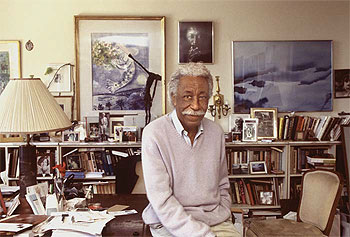 |
→ April 2006 Contents → Feature
|
Don't Say Can't
April 2006 |
 |
||||||
|
There is a story told by jazz aficionados that when somebody asked Dave Brubeck why the legendary and innovative saxophonist Paul Desmond started to play the way he did Brubeck replied, "Because nobody told him he couldn't." Like most black men born in 1912, Gordon Parks was often told that he couldn't. One of his teachers in high school advised her pupils not to waste their parents' money on higher education because they would end up as maids and waiters anyway. Fortunately for him, and even more fortunately for us, Parks was as heedless of the naysayers in his life as Paul Desmond was, and as a result became as legendary in his own field.
Even within the area for which he is best known, photography, he defies categorization. While the core of his work is the expression of the African-American experience that was a reflection of his own upbringing, he was also famous for his photographs of poverty in Brazil, and portraits of Gloria Vanderbilt, Ingrid Bergman with Roberto Rossellini, Alberto Giacometti and Barbra Streisand. For five years he was a regular contributor to Vogue, and his first assignment from LIFE magazine in some ways defined the breadth of his photographic achievements when Wilson Hicks asked him to work on an essay about gang wars in Harlem and also photograph the latest Paris fashions.
In fact, Gordon Parks' "field" wasn't any of the disciplines that he practiced - they were merely the means to an end. His calling and his passion was communication, through whichever form of it he was involved in at the time. His genius was his refusal, indeed his inability, to be restricted and confined by convention, wherever it came from. He was often criticized by prominent African-American activists, including some of his fellow photographers, for working in the mainstream, and in their eyes being a tool of the oppressor. Parks was unmindful of this attitude as he was of his high school teacher's advice. Like his critics he was angry about the racism that he experienced in his native land, and he regarded his camera as a weapon to be used against injustice and repression (his first memoir was titled "A Choice of Weapons"). Unlike them he understood that the inward-directed expressions of anger of many of the black activists of his generation were not as effective as the raising of awareness that came from a broad range of creative activities that reached a wider public through conventional outlets.
We at The Digital Journalist want to acknowledge that with his death on March 7th of this year not only has photography lost a giant, but so too has humanity, so we offer in this issue a mix of his work and recollections from people who knew him well and loved him for it.
Gordon always saw the bigger picture and thought big, and yet he was the least arrogant person you would ever meet. The descriptor that identifies him in my mind is dignified. Whatever he did, whomever he met, he exuded dignity in all his activities. Part of that dignity was the way he dressed. He was the best-dressed man in New York, or indeed anywhere that he was. In the age of the grunge photographer one can only hope that more of his peers will emulate his style, but then there are so many ways in which Gordon Parks as a role model will elevate us as photographers and human beings. Please enjoy our salute to him and give thanks for his long and fruitful life.
© Peter Howe
Executive Editor
|
|||||||
Back to April 2006 Contents
|
|

